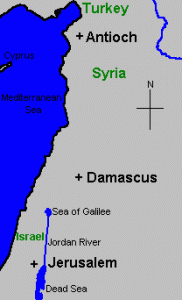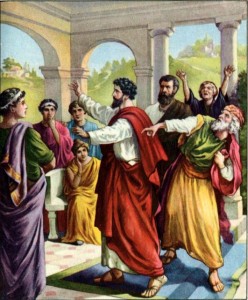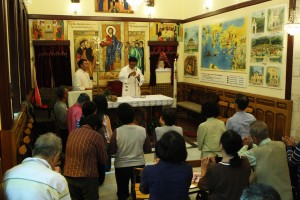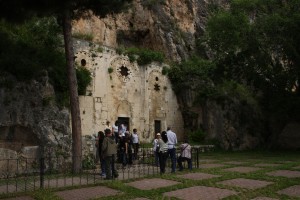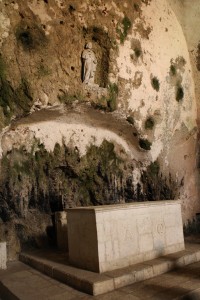Reflections on a Pauline Pilgrimage to Turkey [2]
Antioch on the Orontes – The Mother Church of Gentile Christianity
“The disciples were first called Christians at Antioch.” [Acts 11:25-26]
[1] Biblical Antioch of Syria is present day Antakya in southern Turkey. [2] Paul stirs up Antioch.
We could not ask for a better place to begin our pilgrimage than Antioch, the Mother Church of Gentile Christianity!
Antioch became a Roman city in 64 B.C. and capital of the new province of Syria. It was the third largest city of the Roman Empire after Rome and Alexandria, and had a population of over half a million people. Located on a river, it was known as Antioch on the Orontes, to distinguish it from other cities of the same name, for example, Pisidian Antioch which was located to the north in the Roman province of Galatia. After Jerusalem, Antioch was the second great center of Christianity in New Testament times. There, the disciples of Christ were first called Christians (Acts 11:19-30; 13:1-3; 14:26-28; 15:1-41; 18:22-23; Gal. 2).
To theologians, Antioch of Syria stirs up a great deal of nostalgia. As the Mother Church of Christianity, she played a leading role in the history of Christianity, long before Rome or Constantinople came into the picture.
To us pilgrims from afar searching for Christian roots, Antioch on the Orontes flips us back and forth between the first century starting point of the Christian movement, in which St Paul played a prominent role, and its twenty-first century reality. There is certainly plenty of material for an engaging conversation.
[1] The Past
In The Acts of the Apostles 6:5, we learn that seven “men of good repute, full of the Spirit and of wisdom,” were appointed by the Twelve Apostles to the duty of taking care of the poor and needy in Jerusalem , especially in “the daily distribution”. One of them was a proselyte from Antioch named Nicolaus. He could have been converted at Pentecost [Acts 2]. Stephen, the first Christian martyr, was also amongst the seven [Acts 6:8-8:1]. After the death of Stephen, persecution intensified and Christian believers, except the Apostles, scattered. This was how in the New Testament times, Antioch became one of the most prominent cities in the spread of the incipient Christian movement.
In a linear trajectory of the early expansion of Christianity, Jerusalem stood at the starting point. There, the complexion of the first church was unmistakeably Jewish. The second major centre was Antioch, where believers were a mixture of Jews and Gentiles. The city epitomising the third wave was Corinth, where the converts were predominantly Gentiles.
While St Mark the evangelist spent time in Antioch with St Paul and St Barnabas [Acts 12:25], tradition has it that St Luke the evangelist was born in Antioch. The author of the third Gospel and of the Acts of the Apostles, Luke was a trusted companion of Paul and chronicled Paul’s travel and preaching in Antioch and Asia Minor.
Antioch would develop into one of three major centres of theology in the early church, known respectively as the Schools of Jerusalem, Antioch and Alexandria. The Antiochene school, one of the best in all of Christendom, adopted the Aristotelian realism system, while the school of Alexandria followed Plato’s idealism system of thoughts. In this regard, Antioch rightfully boasts of such Fathers of the Church having come under its tutelage, including St Ignatius of Antioch, St Theophilus of Antioch, Saint Cyril of Jerusalem and St John Chrysostom.
It was inevitable that a major hurdle for this early mixed-church of Jews and Gentiles to overcome was the issue of circumcision. So it was in Antioch that one of the first conflicts within the Church developed between the Apostles Peter and Paul. The conflict was about whether male converts to Christianity needed to follow all the Jewish law including being circumcised. Paul was an adamant advocate in favour of the rights of the Gentiles in this dispute [see Gal. 2:11-21]. It was the resolution of this conflict at the Council of Jerusalem under Saint James the Apostle [Acts 15] that boosted the Antiochian mission to non-Jews, and the dynamic nature of that Christian community in its missionary outreach.
Here too, Scriptures also attested to the historical fact that disciples of Jesus Christ were for the first time called Christians [Acts 11:26]. Through baptism in the name of Christ whose blood was shed on the cross, the cultural walls separating different races were dismantled and fellowship at the same table became a regular feature of their new life. Theirs was a community of believers, a new “we” different from others, needing a new name. In their beliefs and way of life, they had a distinctive group identity. By their lives, therefore, they carried a name not of contempt but of respect and admiration and even wonder. We, too, should be a pilgrimage group of believers, showing faith, and living with a sense of care for the rest of the group and for the people we encounter.
The importance of Antioch is further seen in the fact that it was the sending church for St Paul and St Barnabas’ mission journeys to Asia Minor, Macedonia and Achaia (Acts 13:2; 14:26; 15:25). With its excellent location and communications by land and sea, and with its strong Christian community, Antioch naturally served as the base-camp in Paul’s three famous missionary journeys. From here the great journeys of Paul began, and to it the great Apostle to the Gentiles always returned. Antioch, not Jerusalem, was the very centre from which the Christian faith was propagated all over the Roman world. No other city played such an important part in the earliest beginnings of non-Jewish Christianity.
On our part, we quietly wondered about the missionary character of the Church. The Triune God is God of mission, for God loved the world so much he sent his only Son (John 3:16). The Church therefore does not exist for its own sake, but for mission. A local church may rightly or wrongly proclaim its lack in this or that, and thus happily receive help from all over. But the truth of the matter is, unless and until a local church that receives help has learned to become a church that sends help, it remains a church in need, a receiving-church that perpetually looks inwards, taking care of its own perceived poverty, and staying impoverished and incomplete and learning nothing from the sending-church of Antioch.
[2] The Present
Antioch was destroyed more than five times due to earthquakes, and ceased its commercial and strategic importance. Before the Arabic conquest, almost the entire population of Syria was Christian. As the country underwent deep changes in administration and most of the population shifted from one place to another because of the Arab conquest, the great majority were compelled to embrace Islam. This persecution reduced the Christians to a small minority.
Today, pilgrims are shocked, and dismayed, to hear from Fr. Domenico Bertogli, an Italian missionary working in Antioch and the priest in charge of the small Catholic Church there, that the city has only 1,000 Christians all-told, of which Catholics are only 75 in number. The small Christian population, we were told, made ecumenical intercourse easier.
[1] Mass at the Catholic Church, Antioch. Photo © Teresa Sim. [2] St Peter’s Groto, Antioch. Photo © Teresa Sim. [3] The interior of St Peter’s Groto, showing the Altar and St Peter’s chair. Photo © Teresa Sim.
Pilgrims and tourists alike who come to Antakya will visit the Cave Church of St. Peter (also known as the Grotto of St. Peter; Turkish Sen Piyer Kilisesi). This is an ancient cave church commonly accepted in Antakya as a place for the early Christian community of Antioch to meet, and thus to be the very first Christian church. From the eleventh century on, this cave church took on a very attractive stone façade built by the Crusaders, who identified the grotto during their rule of Antioch from 1098 to 1268.
[3] A Disturbing Reflection
Seeing the practically non-existent faith community in Antioch, and recalling its glorious days in the history of the early church, the mood amongst the pilgrims was clearly somber with a palpable touch of sadness.
Not a few were gently vocal in proposing solutions to rectify this sorry state of affairs. Some began to call for modern day St Pauls and St Barnabases to re-evangelise the Turks. Others silently whispered urgent prayers to St Paul to intervene in this mission field which he once upon a time conquered with such energy and fury. Yet others pensively surrendered it all to the unfathomable mystery of God.
Being in the first week of Easter, our minds quite naturally drew us to some core messages for resurrection-practice in our own lives. In that mood, what occupied our minds incessantly was that the core message of Easter was not the empty tomb. Today, as it was two thousand years ago, the angels would query us as to why we are looking for the living in the place of the dead? Human sentiments draw us to the darkness inside the tomb, but the angels of God direct us to the light outside. And so, what ought to occupy our life energies is not the darkness of the tomb – which is empty anyway – but what we ought to be doing today, tomorrow, and the day after. How will we now live differently? Jesus’ death and resurrection should make a difference. Life cannot continue with business-as-usual. Christian living must now be characterized by resurrection-practices, inspired by the Holy Spirit. For to be a Christian, to follow the Way as the story of Antioch confirms, is to not conform to the patterns of this world. As Jews and Gentiles came together to form a new community in the early church, we too must begin to live in ways that are “strange” to a world that is dominated by excesses and abuses , a world that clamours for power and control, and vehemently claims superiority and privileges. Perhaps then, our “solutions” towards reversing the depressing decline – or practically total disappearance – of our former missionary successes should begin with the most humble of steps, namely, by asking real seriously how differently we must each live our own lives so that others will see in us true evidence to convince them that “we are Christians by our love”.
Copyright © Dr. Jeffrey & Angie Goh, July, 2011. All rights reserved.
You are most welcome to respond to this post. Email your comments to us at jeffangiegoh@gmail.com. You can also be dialogue partners in this Ephphatha Coffee-Corner Ministry by sending us questions for discussion.

